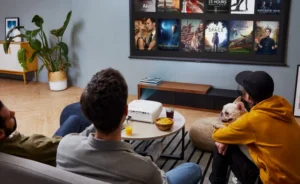How one mother grappled with AIDS through vampire role-playing

I often joke to my friends that I’m a second-generation vampire nerd. Anne Rice was a constant in our house. Vampire Masquerade, Buffy the Vampire Slayer, The most common are plastic fangs with Gothic designs and pins which declare that they will drink your blood. I was destined to become a vampire-loving geek — the first Halloween costume I chose myself was a Nosferatu-inspired black dress, ghost-white face paint, a trickle of blood applied by Mom, and red-pink hair to complete the look (I was 5). My fascination with Twilight grew as I explained my vampiric heritage to my friends and family.. After losing my mother in 2010 to AIDS complications, I used the inherited fascination with vampires as a prism to understand how she reacted to a world that was hostile to her.
My mom’s fascination with vampires predated her diagnosis, but not by much. She wrote her master’s thesis on the literary treatment of vampires in the 20th century. It was 1988, and only one professor in the department at Winthrop University believed vampires were worthy of literary study (an unbelievable claim today, given the continued relevance of Anne Rice’s work). Vampires became my mom’s safe space, and she cogently argued her points anyway, during a time when her own future seemed so uncertain. In the late ’80s and early ’90s, HIV was often a death sentence.
Her own fear of stigma and discrimination means I’m not completely sure when she contracted HIV. Peter, the first man she married, passed away in 1991 due to complications related to AIDS. I found out her status two months before she died by chance. So I never outright asked why she loved vampires; at the time, it would’ve been like asking a flower why it loves the sun. Her small smiles turned conspiratorial whenever we’d find a new vampire novel in a store, Her eyes remained focused when she listened to me rant about Jonathan Lipnicki. The Little Vampire The outright contempt she had for glittering vampires gave way to rants about the meaning of “creatures of the night,” full of gesticulations making her seem much taller than 5-foot-3. Vampires became a language in our home to explain fears, anxieties, dreams: I told her once I wanted to live forever, and she asked me if I thought I’d be lonely. After losing Peter and after my father Geoffrey passed away, I began to think that her mythical stories were her escape from reality.
Role-playing is a world to which I am always drawn back. Vampire : The Masquerade My mom, Geoffrey, and my godparents regularly played Dungeons & Dragons, but her fascination with the Vampire Masquerade She was drawn into RPG online forums, and to a wider community of vampire fans. Vampire Masquerade’s story extrapolates from our known world, embracing the dark, horrific aspects and encouraging players to embrace sex, violence, and danger as elements to play with rather than shy away from. This game is characterized by a strong confrontational element. V:TM, released in 2018, its “Mature Content Warning” actually names AIDS first in a list of “darkness[es] in the real world.” My mom struggled to talk about her diagnosis, and these online communities, I think, gave her a space to sit with her feelings in ways she couldn’t otherwise.
Mom’s laptop went with her everywhere. Everyone knew she journaled most days, but she wasn’t forthcoming with the content. As she grew older, I’m sure part of her wanted to be remembered. She left me over 100 pages worth of fanfiction, written in role-playing games, in a 2-inch black 3-ring binder. The short-lived The Kindred, The aforementioned Vampire Masquerade Her background was a TV series. In a series of role-playing fanfic stories written back and forth through AOL chat, my mom recast herself as Julian Luna, one of the show’s protagonists (although pointedly gave him Geoffrey’s birthday: Aug. 14). Her online role play partner was the Kindred character Cash, a Gangrel vampire in Kindred. Both actors alternated in voicing Morgaine, and Joe, characters that my mother created. There are lines in the exchanges of vampire lovers from her life and both her television series that make her feel as if she is trying to write her life again. “He’s never felt so vulnerable,” she writes, “and paradoxically never so free.” The risque text lines up with another moment from my own memory. In my teens I confessed to her how I felt embarrassed about reading Twilight. slash. She assured me that imagination was a positive thing.
:no_upscale()/cdn.vox-cdn.com/uploads/chorus_asset/file/25063242/Virginia1980s.JPG)
I’m writing this for my mother Buffy the Vampire Slayer She hosted watch parties at her house during the original run of the show. Sarah Michelle Gellar walked in to Sunnydale High School for the first-time on September 17, 1997. My Mom, who was then two weeks short of 37 years old and a twice widowed woman, was also two years away from the death of Geoffrey due to AIDS complications. Most weeks, I stayed at my grandparents’ for a night to let her socialize, but on Buffy nights when I was home, my mom’s voice flew over my head — she sat on the couch, and I laid on the floor in front of the TV. Each episode was the The Rocky Horror Picture Show: She wolf-whistled when Spike sauntered on screen and chimed in on the believability of Giles’ historical rant. It tickled Tara that I had named my two hamsters Willow and Tara. I’ve dedicated many hours trying to wrestle those memories out of my brain, commit them to paper, and to try and make sense of them knowing now how much weight she carried then. Always, I come back to Angel’s and Spike’s feelings.
Spike’s vampire fantasies were based on Billy Idol, which Mom also loved. “Dancing with Myself” played on every car ride, becoming the first song I fully memorized, and the song whisked her back to memories of bouncing around the college concert scene with Peter. Spike’s love for Billy makes me think of him in a positive light. I am reminded of her by his demeanor and complicated love-sex relationship, as well as his wish to create beautiful art in an horrifying world. Spike also finds meaning in his life as it is taken away by government interference. The desire for government to intervene in order to eradicate vampires is similar to the fear my mother felt.
My mother was a lesbian with AIDS. She worked for a paper and was unable to ignore the fact that many people saw AIDS in a negative light as a punishment for homosexuality. AIDS became attached to gay men in ways that created shadows for a woman like her to hide in — even if it meant being forgotten there as well. She met and then ended relationships with two men who were queer, but she also found herself raising a child and was afraid that her HIV status would make people take her away. The heteronormative benefits of her marriages would only last if she did not live out and sought treatment. It’s hard not to see Spike’s willingness on the series to undergo experimentation to become part of Buffy’s world as an echo of my mom’s fears of being open with her sexuality and status: Would she have been told her existence was dangerous to me and become a medical guinea pig to quell the unease?
She also criticised Angel for his aching longing to be with Buffy. Her mouth would turn down, and she’d roll her eyes, perched in the left corner of our overstuffed couch and balancing a Dell laptop on her knees, likely on chat with her friends. I never got the fascination with Angel, so her disdain for him made sense to me — but I wonder if her dislike of Angel-Buffy grew from a season 1 sex-soul change. After the “true happiness” of having sex with Buffy, Angel transforms to Angelus, a mindless, bloodthirsty fiend with no regard for anyone or anything but his own sadistic pleasure. Even now the choice is controversial because of how it depicts love and sex. I can see my mother struggling to accept a storyline that equates sexual desire and a demonic change.
What worries me most is that she thought she was Angelus and she mistook me for an innocent mortal. Hope she knows that I will never be afraid of her. I wish she’d seen that her death wasn’t going to save my world.
Rewatching the famous episode “The Body” now feels like an eerie prediction of the night my mom died. In her room shortly after 10:00 p.m., she died peacefully, after spending the night out for the first month with friends. In “The Body,” Buffy discovers her mother, Joyce, lying in her bed, prone after an aneurysm. The same thing happened to me when I got home. She was alone, dead in all ways. The episode pierces the vampiric fantasy with the quiet tragedy of mundane human death, and it’s one of the few pieces of media that captures the utter everyday tragedy of the hours after someone is gone.
My mom began to think of vampires as a means to forget those days, after she lost Peter and Geoffrey. I’m now sifting my memories, with my mother, and holding the fangs she used to have on her bookcase, going through her. Vampire Masquerade Playbooks are a great way to ground me while I try and understand what the stories could or should be. Rewatch Buffy Imagine her grinning, then her laugh. What I am writing about New York at Night and wonder how she’d compare Julian Luna to Aabria Iyengar’s Margot Fuego: Which Ventrue vampire would she like more? Every bookstore visit is an opportunity to find new vampire stories, each one letting me believe there’s one more message from her waiting for me if I just look hard enough.
It’s not possible for my mother to sit right next me. But I am sure that she is close by. When I’m ready to see where the next vampire story takes me, I know she’ll be with me.
#mother #grappled #AIDS #vampire #roleplaying








